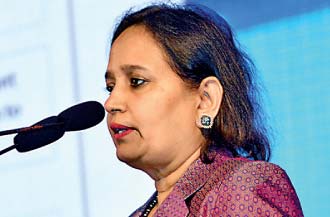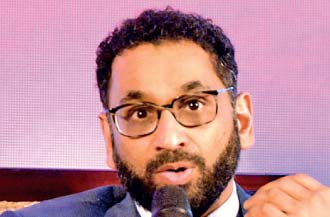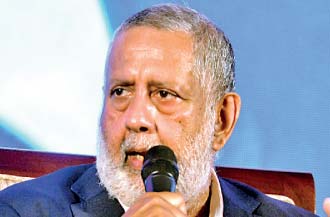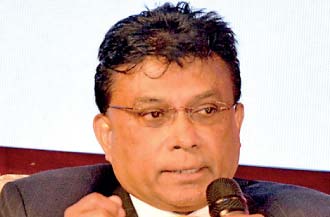Friday Feb 20, 2026
Friday Feb 20, 2026
Thursday, 1 August 2024 03:16 - - {{hitsCtrl.values.hits}}
 |
 The Government plays a critical role in regaining trust and confidence by focusing on education and employment. Leveraging partnerships with companies and universities can create opportunities and attract investments, driving sustainable economic growth – Deutsche Bank Managing Director, Head of HR India/Sri Lanka Madhavi Lal The Government plays a critical role in regaining trust and confidence by focusing on education and employment. Leveraging partnerships with companies and universities can create opportunities and attract investments, driving sustainable economic growth – Deutsche Bank Managing Director, Head of HR India/Sri Lanka Madhavi Lal |
 |
 Financial services must collaborate with academic institutions to integrate relevant skills into curricula from the start. Continuous adult learning and educating business leaders about digital transformation are crucial for building a future-ready workforce – Deloitte Chief Executive Officer, South Asia Romal Shetty Financial services must collaborate with academic institutions to integrate relevant skills into curricula from the start. Continuous adult learning and educating business leaders about digital transformation are crucial for building a future-ready workforce – Deloitte Chief Executive Officer, South Asia Romal Shetty |
 |
 We believe in supporting our employees’ career aspirations, whether it’s moving to the Middle East or Hong Kong. By maintaining strong connections and offering comprehensive well-being programs, we ensure our employees feel valued, which in turn supports our long-term success – HSBC Sri Lanka and Maldives Chief Executive Officer Mark Surgenor We believe in supporting our employees’ career aspirations, whether it’s moving to the Middle East or Hong Kong. By maintaining strong connections and offering comprehensive well-being programs, we ensure our employees feel valued, which in turn supports our long-term success – HSBC Sri Lanka and Maldives Chief Executive Officer Mark Surgenor |
 |
 Sri Lanka must implement discipline, foster a strong work ethic, and increase women’s participation in the workforce to build a future-ready financial services sector. Encouraging families to support women’s contributions is crucial for driving economic growth and leveraging the full potential of our workforce – Sampath Bank Independent Non-Executive Director Aroshi Nanayakkara Sri Lanka must implement discipline, foster a strong work ethic, and increase women’s participation in the workforce to build a future-ready financial services sector. Encouraging families to support women’s contributions is crucial for driving economic growth and leveraging the full potential of our workforce – Sampath Bank Independent Non-Executive Director Aroshi Nanayakkara |
 |
 Sri Lanka can learn from the holistic approaches taken by South and Central American countries during economic crises. Engaging the diaspora, focusing on microfinance, and leveraging technology are key strategies to address retention and attract talent back to the country – McKinsey Managing Partner for Sri Lanka Ganaka Herath Sri Lanka can learn from the holistic approaches taken by South and Central American countries during economic crises. Engaging the diaspora, focusing on microfinance, and leveraging technology are key strategies to address retention and attract talent back to the country – McKinsey Managing Partner for Sri Lanka Ganaka Herath |
 |
 The Sri Lanka Banks’ Association must proactively collaborate with local and regional training organisations to include new areas like Generative AI and Sustainability Finance in their curricula. Leveraging associations like the Asian Bankers Association can enhance training and cross-fertilisation opportunities – Ceylon Chamber of Commerce former Chairman, former Banker Rajendra Theagarajah The Sri Lanka Banks’ Association must proactively collaborate with local and regional training organisations to include new areas like Generative AI and Sustainability Finance in their curricula. Leveraging associations like the Asian Bankers Association can enhance training and cross-fertilisation opportunities – Ceylon Chamber of Commerce former Chairman, former Banker Rajendra Theagarajah |
 |
 Creating awareness about the insurance industry and offering flexible work models has been key to attracting talent, especially women with higher family responsibilities. By providing career opportunities and supporting work-life balance, we can change the perception of insurance as a challenging career choice – AIA Insurance Sri Lanka Director/Chief Executive Officer Chathuri Munaweera Creating awareness about the insurance industry and offering flexible work models has been key to attracting talent, especially women with higher family responsibilities. By providing career opportunities and supporting work-life balance, we can change the perception of insurance as a challenging career choice – AIA Insurance Sri Lanka Director/Chief Executive Officer Chathuri Munaweera |
 |
 Mastercard’s AI-based platform, ‘Unlock’, personalises career development and learning opportunities for our employees. This approach helps us address talent shortages effectively by empowering individuals to take control of their skill development and career progression –Mastercard Senior Vice President, Human Resources Joseph Fernandes Mastercard’s AI-based platform, ‘Unlock’, personalises career development and learning opportunities for our employees. This approach helps us address talent shortages effectively by empowering individuals to take control of their skill development and career progression –Mastercard Senior Vice President, Human Resources Joseph Fernandes |
 |
 HR professionals must develop AI literacy to navigate the evolving workforce landscape. Using AI for talent prediction and personalised training is essential for managing job displacement and ensuring organisations remain competitive in the future – Alliance for AI & Humanity President Dr. Anton Ravindran HR professionals must develop AI literacy to navigate the evolving workforce landscape. Using AI for talent prediction and personalised training is essential for managing job displacement and ensuring organisations remain competitive in the future – Alliance for AI & Humanity President Dr. Anton Ravindran
|
By Michelle Therese Alles
The Finance Services Pillar at the recent Human Capital Summit 2024 showcased a compelling discourse on the future of financial services, featuring keynote speeches and panel discussions from some of the foremost minds in the field. The panel delved into the transformative impact of technology, the critical importance of human capital, and the evolving regulatory landscape, providing a comprehensive roadmap for navigating the challenges and opportunities that lie ahead in the financial services industry.
Deutsche Bank Managing Director, Head of HR India/Sri Lanka Madhavi Lal delivered a keynote address that resonated with the audience. Emphasising the transformative power of effective talent management and retention, she highlighted the critical role of human capital in driving organisational success. She began by acknowledging the high quality of discussions at the summit and commended Sri Lanka for organising such a significant event.
She discussed the various challenges companies face in talent management and retention, underscoring the importance of good leadership, employee engagement, and a supportive organisational culture. Lal illustrated how every individual aspires to make a meaningful impact at work, and it is the responsibility of organisations to tap into this intrinsic motivation, pointing out that employees stay with companies that provide good leadership, engaging work environments, and a positive culture. She stressed that organisations need to focus on these areas to retain talent and encourage employees to put in discretionary effort.
Delving into specific strategies for retaining talent, she shared Deutsche Bank’s approach to addressing these challenges, emphasising the significance of offering career growth opportunities, flexible working arrangements, and recognition programmes. She noted that post-COVID-19, flexibility has become even more crucial, with many employees preferring remote or flexible work schedules. She also highlighted the importance of creating an inclusive employer brand that focuses on corporate social responsibility and environmental, social, and governance (ESG) factors, which are increasingly important to younger talent.
Lal concluded her address by discussing future-focused strategies for talent management. She emphasised the need for organisations to have a clear purpose, a strong commitment to diversity, equity, and inclusion, and policies that cater to the diverse needs of a multi-generational workforce. She highlighted the importance of upskilling employees to adapt to technological advancements and mitigate fears of job displacement due to automation. Lal’s address was a call to action for organisations to innovate in their talent management practices and create environments where employees feel valued, engaged, and equipped for the future.
Pillar Head, HNB Managing Director/Chief Executive Officer Jonathan Alles commenced the panel by calling on HSBC Sri Lanka and Maldives Chief Executive Officer Mark Surgenor to talk about how HSBC had been impacted by the recent exodus of staff migrating for higher studies, and what measures had been taken to increase the talent pipeline, build capacity, and retain staff.
Surgenor emphasised HSBC’s commitment to its employees, noting that the bank has been in Sri Lanka for 132 years and employs a significant portion of the workforce in international banks within the country. He stated, “If people came to us and said, ‘I’m going to move to the Middle East,’ we would find them a job with HSBC Middle East. If they said, ‘I want to move to Hong Kong,’ we would find them a job with HSBC Hong Kong,” adding that this strategy not only supports employees’ career aspirations but also maintains strong connections through unofficial alumni networks, enabling returning talent to reintegrate seamlessly.
Robust employee value proposition
In addressing staff retention and capacity building, Surgenor highlighted the importance of a robust employee value proposition. “It’s not just about pay,” he said, emphasising the comprehensive well-being programs implemented, including flexible working arrangements, mental and physical health initiatives, and sustainable pay structures. He also underscored the significance of career development opportunities, with HSBC offering short-term assignments overseas to enhance skills and knowledge. By fostering a culture of continuous development and support, HSBC ensures that whether employees decide to stay or leave, the bank remains an attractive and supportive employer. “Think long term, keep the door open, keep the relationships, and build capability like never before,” Surgenor concluded.
Sampath Bank Independent Non-Executive Director Aroshi Nanayakkara addressed the necessary cultural changes required to make Sri Lanka’s financial services sector future-ready. She emphasised three critical areas: discipline, work ethic, and women’s participation in the workforce. Nanayakkara stated, “We need to implement discipline for our people,” highlighting the importance of proper frameworks to harness the country’s high intelligence and capabilities effectively. She also stressed the need for a strong work ethic, pointing out that Sri Lanka must move away from a historically welfare-oriented mindset. “We need to make a case where you work hard, you earn, and you have a better life,” she added, emphasising the value of hard work for financial success.
Additionally, Nanayakkara underscored the importance of increasing women’s participation in the formal workforce. Currently, only 30% of employable women in Sri Lanka are part of the formal workforce, which significantly constraints GDP growth. She pointed out the cultural shift needed in society to encourage families to support women’s contributions. “The wives, the mothers also need to be contributing and coming into society,” she asserted. By addressing these cultural changes, Sri Lanka can create a more robust and future-ready financial services sector, capable of leveraging the full potential of its workforce.
McKinsey Managing Partner for Sri Lanka Ganaka Herath drew parallels between Sri Lanka’s recent economic challenges and the crises faced by South and Central American countries in the ‘80s and ‘90s, particularly focusing on Argentina and Chile. Herath noted that these regions experienced significant economic migration, which accelerated impacts on the financial sector. He pointed out, “They took a very holistic approach,” addressing not just retention through culture and compensation but also considering flexible working and work-life balance to aid retention efforts. He emphasised that these countries started thinking long-term even back then, a strategy that Sri Lanka could benefit from adopting.
Herath highlighted Argentina’s innovative approach, which centred on diaspora engagement. “Argentina took the approach that diaspora was going to be absolutely key,” he stated, explaining how the government and banks collaborated to attract skilled workers back with competitive packages and tax incentives. Similarly, Chile adapted by catering financial services to local talent, focusing on microfinance and financial inclusion. Herath also mentioned the example of ITA from Brazil, which used the crisis as an opportunity to digitise and create a robust technology platform. “It has to be a very holistic approach of retention, attraction, and adaption,” Herath concluded, emphasising the multifaceted strategy needed to navigate and recover from such crises.
Proactive role for SLBA
Alles next called on former banker, and former Chairman of the Ceylon Chamber of Commerce, Rajendra Theagarajah, for his take on how the Sri Lanka Banks’ Association could leverage its regional banking associations to play a role in building, increasing, and retaining talent within the industry. Theagarajah emphasised a proactive role for the Sri Lanka Banks’ Association (SLBA) in engaging with local training organisations, highlighting the importance of SLBA collaborating closely with the Central Bank’s Training Centre and the Institute of Bankers Sri Lanka Education Hub. “Instead of waiting to receive what they churn out, there is a role for SLBA to be more proactive and demand on the curriculum development,” he stated, stressing the need for inclusion of new areas such as Generative AI, Sustainability Finance, and Cyber Security in both exams and continuing professional development.
Moreover, Theagarajah underscored the potential of leveraging regional banking associations like the Asian Bankers Association (ABA) to increase exposure and cross-fertilisation through exchange programs and international training initiatives. “With more than 100 members, we have an amazing leveraging ability,” he noted, pointing out the numerous high-quality training programs and inter-country visitation opportunities provided by ABA.
He also called for a stronger connection between SLBA and business chambers, advocating for SLBA’s active participation in chambers like the Fintech Association and the Ceylon Chamber of Commerce to align industry needs with business demands. Additionally, he suggested that SLBA should take the initiative in shaping an industry-specific, market-driven fintech sandbox rather than relying solely on the central bank’s regulatory framework.
Moving from Banking to Insurance, Alles turned to AIA Insurance Sri Lanka Director/Chief Executive Officer Chathuri Munaweera, for her thoughts. Munaweera highlighted the significant hurdles faced by the insurance sector in attracting talent. “A few years back, we weren’t even listed as one of the most preferred career choices. To address this, we focused on creating awareness about the industry,” she explained. This involved collaborating with universities to incorporate insurance into their curricula and offering internships and apprenticeships to students.
Additionally, she emphasised the industry’s efforts to change the perception that insurance sales are a difficult job. “Half of our insurance salespeople are now women,” Munaweera noted. “We created career opportunities for women—especially those in their 30s—with higher family responsibilities and income needs, and we also provided flexible work models and tools to support their work.” She also discussed the post-crisis strategy of encouraging employees to return to the office to maintain organisational connection, which subsequently allowed for the introduction of flexible working hours and the employment of Sri Lankan talent working full-time from overseas.
Mastercard Senior Vice President, Human Resources Joseph Fernandes addressed the pressing issue of talent shortage and elaborated on how MasterCard has navigated this challenge successfully. He began by highlighting the importance of personalisation in today’s workforce. He stated, “Gone are the days wherein we could manage your talent by identifying a handful of people and creating one-size-fits-all programmes. It doesn’t work these days.” Joe emphasised the shift towards a hyper-personalised approach, drawing parallels with consumer organisations that effectively tailor their products to diverse customer needs.
AI-based platform
To combat talent shortages, MasterCard implemented an AI-based platform called ‘Unlock’, designed to cater to individual learning preferences and career development. Joe explained, “We picked up the learning from digital social platforms and built this platform which allows employees to create profiles, connect through mentorship programs, and gain exposure to different domains. Joe highlighted the benefits, saying, “The best way to manage scale is an AI-based platform which can help you manage the scale, build your network, and offer mentoring programs.” This innovative approach has allowed MasterCard to empower employees to take control of their skill development and career progression, effectively addressing the talent gap.
Alles posed his next question on the skills HR professionals needed to effectively partner with AI technologies to Dr. Anton Ravindran, President of Alliance for AI & Humanity, and author of the book, ‘Will AI Dictate the Future?’. Dr. Ravindran’s response highlighted the profound impact AI is having on the workforce and the essential role HR professionals must play in this transition. He underscored the urgency of adapting to AI’s advancements, emphasising that “yesterday’s skills and talent won’t make tomorrow’s enterprises competitive.” He pointed out the significant job displacement predicted by the World Economic Forum, noting that by 2030, “nearly 300 million jobs will be replaced worldwide because of AI.” This shift affects both white-collar and blue-collar jobs, making the role of HR crucial in managing this transition.
Dr. Ravindran outlined key strategies for HR professionals to effectively integrate AI. He stressed the importance of using AI for talent prediction, personalised training, and sentiment analysis. He also emphasised the need for HR professionals to develop AI literacy, which includes understanding and appreciating how AI impacts organisations and talent. Additionally, he highlighted emerging skills such as Data Analytics, Project Management, and Change Management, which are essential for HR to navigate the evolving landscape, reinforcing the necessity for HR to lead in this dynamic environment.
Deloitte Chief Executive Officer, South Asia Romal Shetty emphasised the critical need for the financial sector to develop future-ready skills and attract top talent in an increasingly volatile and technologically advanced world. He highlighted that the first step is to identify the necessary skills, such as technology skills in AI and cloud computing, and essential soft skills like resilience and adaptability. Mr Shetty emphasised the importance of understanding and addressing the specific needs of the industry, and also pointed out the importance of team-building skills, noting that teamwork is often under-emphasised outside of sports and academic settings.
To effectively retrain and retain a digital workforce, he suggested a collaborative approach with academic institutions, recommending that financial services adopt colleges or universities to integrate relevant skills into their curricula from the first year of study, underscoring the importance of early engagement. He also stressed the need for continuous adult learning, lamenting that “less than 0.5% of the world’s GDP is spent on adult learning.” Romal concluded by stressing the importance of educating business leaders about digital transformation, as their understanding is crucial for any meaningful change.
Madhavi Lal concluded the panel by emphasising the critical role of the Government in regaining the trust and confidence of the people, particularly the youth, by focusing on education and employment. “There are companies and universities willing to come and set up here; leverage that,” she advised, highlighting the potential for collaborative efforts and encouraging new ones to set up in the country to enhance educational opportunities. Additionally, she stressed the importance of creating a favourable environment for businesses to establish themselves, thereby generating employment opportunities, underscoring the need for strategic incentives to attract investments and foster economic growth.
Evolving landscape of financial services
The Finance Services Pillar at the Human Capital Summit 2024 provided a comprehensive exploration of the evolving landscape of financial services, with an emphasis on the critical role of human capital and the transformative impact of technology. The insights shared by industry leaders highlighted the multifaceted strategies needed to navigate current challenges and seize future opportunities.
Key themes such as talent management and retention, the importance of upskilling, the integration of AI, and fostering an inclusive and flexible work environment were recurrent throughout the discussions. The consensus was clear: to thrive in an increasingly digital and volatile world, financial services must invest in continuous learning, embrace technological advancements, and cultivate a supportive and engaging organisational culture.
Moreover, the role of the Government in creating a conducive environment for education and employment was underscored as essential for building a robust financial services sector. By leveraging collaborative efforts with academic institutions and providing strategic incentives for businesses, Sri Lanka can attract and retain top talent, fostering sustainable growth and innovation in the industry.
Pix by Upul Abayasekara